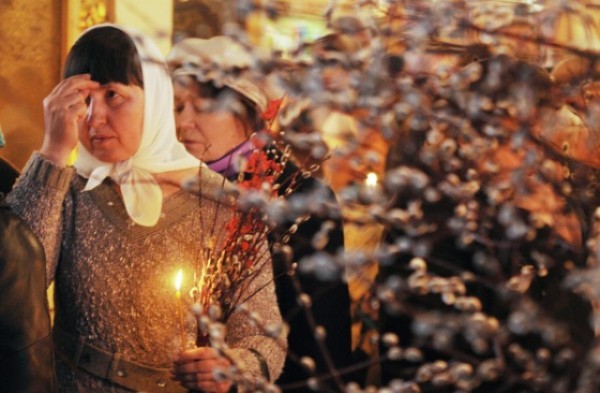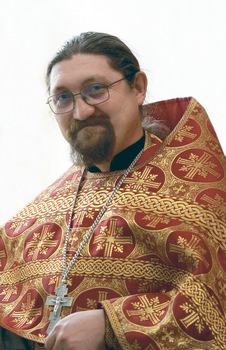Fr. Sergei, to be honest, we very often cross ourselves mechanically, or just because at the moment in the service one ought to cross oneself, or because we are afraid of something. It very often happens that someone who comes to church simply does not yet know what to do there, he is unable to unite himself inwardly to the Divine service, and due to this confusion crosses himself mindlessly. In fact, what should a Christian be aware of and experience when he makes the Sign of the Cross?
Unfortunately, we do very many things in church mechanically or mindlessly, forgetting that this is the supreme means of progression in the spiritual life.
The Sign of the Cross is our weapon. In the solemn, triumphant prayer to the Cross, “Let God arise and let His enemies be scattered…” it says that the Cross is given to us “for driving away all enemies.” What kind of enemies is it talking about? The Apostle Paul, in his Epistle to the Ephesians, writes: “Put on the whole armour of God, that ye may be able to stand against the wiles of the devil. For we wrestle not against flesh and blood, but against principalities, against powers, against the rulers of the darkness of this world, against spiritual wickedness in high places. Wherefore take unto you the whole armour of God, that ye may be able to withstand in the evil day, and having done all to stand” (Ephesians 6:11-13).
The world that the Lord granted us, in which He has given us to live, is of course beautiful. But it is immersed in sin. And we ourselves are damaged by sin, our nature has been distorted by it, and this allows the fallen spirits to tempt us, torment us, and lead us on the path to destruction. Anyone who leads a spiritual life will, as a rule, understand that he cannot change by himself: he needs to seek help from Christ. When we make the Sign of the Cross, we are first of all calling upon his help for us.
Of course, one should not think of the Sign of the Cross as some kind of magical gesture that ensures results. The Cross represents a Sacrifice: Christ’s Sacrifice made out of love for us. By making the Sign of the Cross, we are witnessing that His Sacrifice was made for us, and that He is the main thing for us in our lives. The bodily, physical movement is, at the same time, a prayer of the body, the body’s participation, as a part of our human essence, in this life in Him: “Know ye not that your body is the temple of the Holy Spirit Which is in you, which ye have of God, and ye are not your own? For ye are bought with a price: therefore glorify God in your body, and in your spirit, which are God’s.” That is also the Apostle Paul, in 1 Corinthians 6:19-20. The body was redeemed by Christ’s Cross, just as was the soul. With the help of the Sign of the Cross, we try to crucify the lusts of the body and the lusts of the soul. And it is a problem that, due to our negligence, the Sign of the Cross has become too familiar to us and is done by us without reverence. Here we need to remember the words of the Prophet Jeremiah: “Cursed be he that doeth the work of the Lord with slackness” (Jeremiah 48:10). This movement should be done very seriously, with deep feeling. Why do we not give thought as we fold our fingers for the Sign of the Cross? After all, this is a word incarnate in action: by this we are in fact confessing the Holy Trinity.
The Sign of the Cross is an accountable action: when we make it, we should feel and see the Cross of Christ and His suffering, remembering the price that was given for the redemption of our sins and that height to which we ascend through the Cross. The Cross unites us with heaven and the Cross unites us with one another, for the Lord Jesus Christ was crucified not for me alone, but for all.
Both as a priest and as a Christian, I have often noticed how people who know how to pray deeply, and not for show, make the Sign of the Cross very beautifully. What this beauty is, is difficult to convey in words, because it is a reflection of the beauty of their spiritual world. But when one crosses oneself for show, or simply because it is called for, this is also evident, and causes repulsion… and pity. Thus, one and the same movement expresses various internal states of a person. In the first case, it is the fruit of spiritual labor; and in the second there is an emptiness behind the gesture.
Has this custom of Christians crossing themselves been around for a long time?
The Sign of the Cross has been with Christians since deep antiquity. John the Theologian, as we know from his life written by his disciple Prochorus, healed a sick person lying by the roadside with the Sign of the Cross; the pious Ireus, following the counsel of the Apostle Philip, cured the ailing Aristarchus by the same means. St. Nonna, the mother of St. Gregory the Theologian, while very sick saw in a dream how her son made the Sign of the Cross over bread, by which she was healed. The Holy Matyrs Thecla, the disciple of the Apostle Paul, when the bonfire was kindled for her, made the Sign of the Cross over the wood, and no harm came to her. The martyrs of the Coliseum stopped hungry beasts with the cross. The Cross works on all of creation, it is the “guardian of the whole Universe and the beauty of the Church,” as the Church chants on the Exaltation of the Cross.
Opponents of Christianity ask: if the Cross was just one possible instrument of punishment, why did it become a sacred object? “And if Christ had been beheaded by a sword, as was John the Baptist, would you wear a sword around your neck?” one sometimes has occasion to hear.
With God, nothing happens “just like that.” Crucifixion was one of the cruelest punishments of the ancient world. This was in a way a masterpiece of human cruelty. It was precisely where cruelty triumphed that suffering love brought man out of the captivity of sin. It came from the very core of violence, from the core of lovelessness. It was precisely in this way that the Lamb of God bore our griefs and carried our sorrows (Isaiah 53:4), and the Cross symbolizes this. The Sign of the Cross is a witness to the fact that Christ is with us everywhere and always, in all our sufferings.
But then why do we cross ourselves – sometimes even unconsciously – when things are difficult, painful, or frightening for us?
By making the Sign of the Cross in difficult moments, we are seeking Christ’s help. After all, things can be difficult for us not only due to external causes, but also from incomprehensible terror and despair that have accumulated somewhere in the depths. Being tempted, we make the Sign of the Cross on ourselves in order to ward off temptation. Satan has the ability to act upon us to the extent to which sin has grown in us. When Christ was tempted in the wilderness, He was offered all the kingdoms of the world (cf. Luke 4:5-8). How could he – a nonentity, who could not live, and does not live – offer the Son of God that which, as a fallen angel, did not belong to him? He could, because the world belongs to him through sin. That is why is he called the prince of this world, the changing and fallen world. But Christ conquered him. Then, in the Judean desert, victory was expressed in the rejection of temptation. But it was ultimately killed by the suffering on the Cross, by the Sacrifice of the Cross. Therefore we make the Sign of the Cross: in order to conquer any temptation from Satan. By the Cross we burn and cast him away without giving him a chance to act.
Let us recall how fearful and angry evil spirits always become when a recluse comes to their empty space and sets up a Cross on it: “Go away! This is our place!” So long as there was no one with prayer and the Cross, here they at least had the illusion of power. Of course, an evil sprit can always conquer someone, if he gives in to them, but one can always conquer Satan. Satan is set aflame because man communes of Christ’s victory, of the Sacrifice of the Cross.
Does that mean that some one who wears a Cross and makes the Sign of the Cross should himself be ready for sacrifice?
Undoubtedly. God is love (John 4:8) – but not simply love, but sacrificial love. The highest manifestation of this love is sacrifice. Leading to it are other manifestations: preaching, the healing of the afflicted, and the feeding of the hungry. The Evangelist John (3:16) testifies: “For God so loved the world, that He gave His Only-Begotten Son, that whosoever believeth in Him should not perish, but have everlasting life.” And we who follow Him should, to the best of our abilities, repeat this by serving all our neighbors. This is what it means for us to bear our Cross: “If any man will come after Me, let him deny himself, and take up his Cross, and follow Me” (Matthew 16:24).
All the same, what is the difference between the Christian perception of wearing a Cross and wearing one as an amulet “so as not to drown or get into a car crash?”
Indeed, one needs to draw a line between wearing a Cross piously and where this is even used blasphemously; to separate magic from Christian mysticism. I would suggest that here, as in all of Christian life, the measure of all things is Christ.
What does someone want from wearing a Cross, what does he see in it? If he sees Christ crucified on it, if he feels like a partaker of this Sacrifice, if he understands that his salvation is impossible without this Sacrifice – then he wears the Cross worthily and legitimately. Otherwise, the Cross will not help him. One does not pour water into a leaky vessel. Someone who does not have a correct conception of Christ’s Sacrifice is not in the state of faith. And the state of faith is the whole vessel of the soul into which God’s grace is poured.
Translated from the Russian.


















